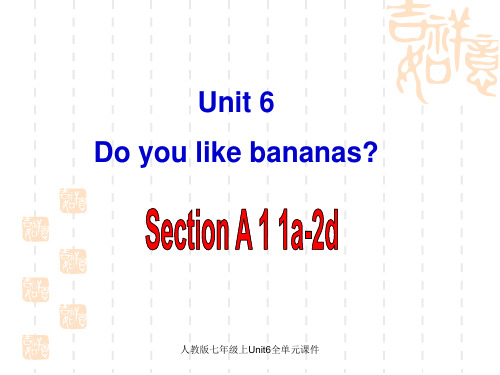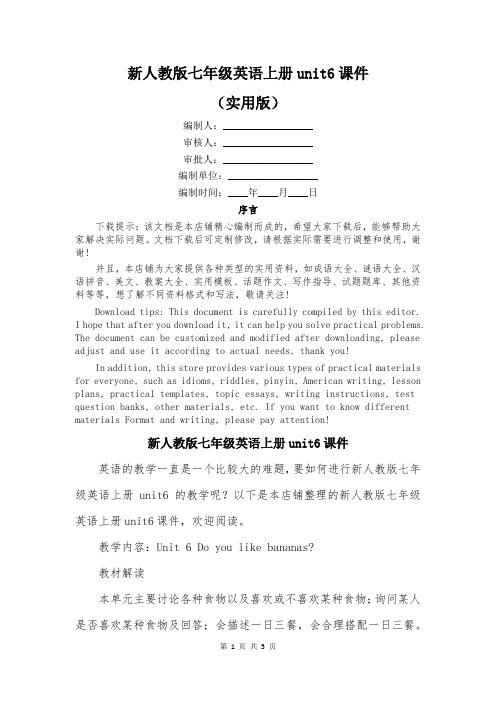2018秋七年级英语(人教版)上册课件:Unit 6 第4课时
2018秋人教版七年级英语上册Unit 6 Do you like bananas ?课件:Unit

For breakfast,I like __b_r_e_a_d_,but I don't like_h_a_m__b_u_r_g_e_r_s __o_r__eg_g_s_______. For lunch,_________________________________________. And for dinnIerl,ike__r_ic_e_a_n_d__v_e_g_e_t_a_b_le_s_,__b_u_t_I__d_o_n_'t_l_i_k_e_s_a_la_d_.
vegetables
本题答案不唯一。
Self Check 1
Do you know the plurals of these words? Put them in the correct columns.
hamburger tomato carrot photo banana
strawberry hat
人教版七年级英语上册教学课件:Unit 6 第四课时

David: OK. So what fruit do you like? Do you like bananas? Cindy: Well, I don’t like bananas. But I like oranges and apples. David: What about lunch? Do you like salad? Cindy: Yes, I really like it. David: Hmm … and do you like hamburgers for dinner?
(3) 当want 的后面接形容词时, 则要用“want to be +形容词” 结构。 I want to be healthy. 我想要健 康。
BACK
+s
+es
y→i+es
1. Sports star eats well!体育明 星吃得好! (1) 本句话在文章是标题,其完
整的句子是:A sports star eats
well。
sports常用作复数,后面直接接
单数名词,如sports
collection(体育收藏); sports game(体育运动);sports
BACK
3. What do you like for what在句中作动词like的宾语, 表示“喜欢什么”;后面的
breakfast?你早餐喜欢吃什么?
for breakfast表示目的,可以
直接译成“早餐你喜欢吃什
么?”。
She likes noodles for breakfast. 她早餐喜欢吃面条。 I want to have rice for lunch. 我 午餐想吃米饭。
Cindy: Oh, no, they’re not healthy. I like chicken for dinner. David: OK. well, one last question — do you eat ice-cream after dinner? Cindy: Err … I like ice-cream … but I don’t eat it. I don’t want to be fat.
最新人教版七年级上Unit6全单元课件

1 B: Yes, I do. A: Do you like oranges?
3 B: Yes, I do.
人教版七年级上Unit6全单元课件
1c Practice the conversations above with your partner. Then make your own conversations.
Bill: Sounds good. John likes hamburgers.
Jack: Oh, I don’t like salad. Bill: But John likes salad,
and it’s his birthday. Jack: Yes, you’re right.
What about the fruit? Tom: I think John likes strawberries and apples. Bill: OK. Let’s have strawberries and apples then.
人教版七年级上Unit6全单元课件
2d Role-play the conversation.
Jack: Hey, John’s birth day dinner is next week. Let’s think about the food.
Tom: Sure. How about burgers, vegetable salad, and some fruit?
strawberry --- strawberries
rice
tomato ---- tomatoes
Unit 6 第4课时 Section B(2a-2c)(课件)七年级英语上册(人教版)

Doesn’t like bananas
hamburgers, eating ice-cream
Why It’s healthy.
They’re not healthy. She doesn’t want to be fat.
Cindy has good eating habits, so she is very healthy.
Careful reading
n.明星; 星星 v.吃 adv. 好;令人满意地
ask sb. about sth. 询问某人某事
Sports Star Eats Well!
n. 习惯 eating habits 饮食习惯
David asks the volleyball star, Cindy Smith, about her eating habits.
Cindy: Well, I don't like bananas. But I like oranges and apples.
David: What about lunch? Do you like salad?
Cindy: Yes, I really like it. 是的, 我非常喜欢沙拉。 really adv.真正地
5 Post-reading
➢ Discussion What do you like for breakfast, lunch and supper? I like … for breakfast/lunch/supper.
doesn't want to be fat.
T
5. She has good eating habits.
T
Reading and Retell Cindy is a volleyball star...
新人教版七年级英语上册unit6课件

新人教版七年级英语上册unit6课件(实用版)编制人:__________________审核人:__________________审批人:__________________编制单位:__________________编制时间:____年____月____日序言下载提示:该文档是本店铺精心编制而成的,希望大家下载后,能够帮助大家解决实际问题。
文档下载后可定制修改,请根据实际需要进行调整和使用,谢谢!并且,本店铺为大家提供各种类型的实用资料,如成语大全、谜语大全、汉语拼音、美文、教案大全、实用模板、话题作文、写作指导、试题题库、其他资料等等,想了解不同资料格式和写法,敬请关注!Download tips: This document is carefully compiled by this editor.I hope that after you download it, it can help you solve practical problems. The document can be customized and modified after downloading, please adjust and use it according to actual needs, thank you!In addition, this store provides various types of practical materials for everyone, such as idioms, riddles, pinyin, American writing, lesson plans, practical templates, topic essays, writing instructions, test question banks, other materials, etc. If you want to know different materials Format and writing, please pay attention!新人教版七年级英语上册unit6课件英语的教学一直是一个比较大的难题,要如何进行新人教版七年级英语上册unit6的教学呢?以下是本店铺整理的新人教版七年级英语上册unit6课件,欢迎阅读。
2024年秋季新人教版7年级英语上册课件 Unit 6 第4课时SectionB(3a—3c)

Ask a person who works in that profession questions to find out his or her workday routine. Complete the table below.
3c
Give a report in class.
3c
Read 3c and complete the chart.
Unit 6
A Day in the Life
Section B(3a—3c)
3a
Choose a profession that you want to know more about.
police officer
teacher
farmer
reporter
bin结构分析
谢谢聆听!
1.写一篇关于其他职业的作文。2.了解更多职业。3.完成相应练习题。
教学的艺术不在于传授本领,而在于善于激励唤醒和鼓舞
get up
have breakfast
have lunch
start work again
go home
watch TV or talk
go to bed
3c
Read 3c and answer the questions.
1. What profession was mentioned in the passage?2. How long does writer’s uncle work in the morning? How about afternoon?3. What time does writer’s uncle have breakfast, lunch and dinner?
2024年新人教版七年级上册英语教学课件 Unit 6第4课时(Section B 1a-2b)

Task 4: Read the text and underline Timo’s
MacytniavmiteieissT. imo Halla. I’m 13 years old. I live with my parents in
Helsinki, Finland. Now it’s December. Every Tuesday, I usually get up at 7:40. I often listen to the news or music. After breakfast, I walk to school. It’s only a 10-minute walk. My school begins at 9:00. There are 18 students in my class. Each lesson is 45 minutes long and there’s a break between lessons. I have one Finnish lesson and two home economics lessons in the morning. After that, I have lunch at 12:00. The afternoon lessons begin at 12:30 and finish aI tu2su:1a5ll.yTgheetnhIogmoetoarmouynidce4:h0o0c.kIet’ys callureba. dy dark outside. I often have dinner at 6:00. After that, I read with my parents for an hour. That’s an important part of my everyday life. Then I prepare my schoolbag for the next day. At 9:30, it’s time for me to go to bed.
人教版七年级英语上册 Unit 6第4课时(Section B 2a-2c)

Careful reading
Task 1: 2b Read the magazine article and circቤተ መጻሕፍቲ ባይዱe the
food words.
Task 2: read and choose
1.For breakfast, Cindy likes ______.
A. eggs
B. bananas
√
vegetables √
eggs
√
chicken
√
hamburgers
√
ice-cream
√
Look and guess
✓ Who is she? ✓ What is her occupation(职业)? ✓ What food does she have every day? ✓ Do you think she has a healthy eating
Task 5: read and discuss
1. Are Cindy’s eating habits
heathy?
2. Do you like her eating habits?
3. How can we make a healthy
2c WCriitnedfyivleikseesntheenacletshyabfoouotdC. indy’s eating habits.
Unit 6 Do you like bananas?
Section B 2a-2c
R·七年级上册
Learning By the end of thoebcjelacstss, you will be able
t1o. …Learn the key words and phrases.
七年级英语上册Unit 6第4课时 Section B(1a-1e)教案人教新目标版

教材简析Section B在Section A的基础上进行话题内容拓展。
介绍了更多有关实物的词汇,听说活动,阅读活动和写作活动都围绕早餐、午餐和晚餐的话题展开,让学生进一步谈论人们对不同实物的喜好,反思不同的饮食习惯,并探讨健康饮食的问题,从而深化了本单元的话题。
预设目标1.知识目标:1.New words:breakfast ,lunch2. –Does Tom like carrots? –Yes, he does.2.语言技能目标:A、能表达喜欢和不喜欢的食物B、通过听、说、读、写四项技能的训练,促进学生语言运用能力的提高3:情感目标:A、通过学习西文食品文化,促使学生了解西方生活方式与文化,培养跨文化交际的意识;B、通过开展小组活动,指导学生积极与他人合作,培养他们的合作精神;C、通过任务型活动,使学生学会在实际生活中均衡饮食,合理配餐。
教学重难点重点:1.Key sentences:--Does Tom like carrots? –Yes,he does 2.通过对食物名词的分类,让学生掌握食物的类型。
通过听说的训练,人学生掌握谈论某人好恶的句型难点:一般现在时中单数第三人称的变化形式教具准备录音机、磁带、课本,教学案知识链接中西方饮食观念的差异教法学法直观教学法、模仿示范法、情境教学和合作学习法。
教学过程Step 1 Warming-up and revision1Step 1 Check the homeworkT:Now let’s cxchange your exercise books and help each other.Try to correct it.(Ask different students to report his/her conversatio. Step 2 Review the wordsT:You know we have learnt so much delicious food. Now Let’s playa game with the food. Let’s see who will say the names of the fo odas many as possible during a minute.(The teacher will give the students a minute to prepare it.Then ask someone to say.)S: Salad, apples, bananas, ice crea m…(Choose the three students who said the most and give some foodas presents.)Step 3 New words①Present the new words.T:How many meals do you have every day?Ss:Three.T:What are they?(The students can answer them in Chinese.) Ss:They are “早餐、中餐和晚餐”.T:Oh, yes. In English “早餐”we can say “breakfast”.(Show a picture of the breakfast)Read after me, “breakfast”.B-R-E-A-K-F-A-S-T,breakfast. Ss: B-R-E-A-K-F-A-S-T,breakfast.T:Do you have your breakfast every day?S1:No, sometimes I get up late, I have no time to eat.T:I think it’s not good for your health. (Teach the other two words lunch, dinner in the same way.)②Practice the words.(Do it for lunch and dinner in the same way.)T:Look at 1a, and write the number in the box next to the correct f ood.(Then the students finish off 1a.)T:How many other food words can you add to the chart?Try to write them down in the chart.Fruits:Vegetables:(The students write them down as soon as possible and then read them. See who w ill add m ost.)Step 4 Practice the listeningT: Look! There are so many foods. Maybe they are very delicious. Which food do you like? Do you like apples? (Show the picture.) S1: …T: How about chicken? Do you like it ?S1: …T: Can you guess what food I like?S1: Do you like…?T: No, I don’t.S2: Do you like…?S3: Do you like…?T: Yes, you are right. I think you are very lucky. But I have two friends. They are Sally and Tom. Do you know what food they like? Now, let’s listen and find out the food you hear.(Play the recording 1c in Section B.Ask the students to circle the food they hear in 1aThen check the answers.)T: Now open your books and listen again. Fill in the char in 1d. (Play the recording the first time. Students listen to th e conversation and write in the answers on their charts. Play the recording t he second time and then the students can check theiranswers to be sure they are correct.)T: Does Sally like salad? S: Yes, she does.T: Work in pairs about the chart.Step 5 TaskGo on a picnic with a group of friends and make a list of food to buy.①Divide the students into six groups.②Talk about what the students in your group like and dislike andmake a list.③The leader in each group reports to the class.板书设计Unit 6 Do you like bananas? Section B 1a-1e 2.New words: breakfast ,lunch--Does Tom like carrots? –Yes,he does作业Make a survey about “What do yo ur parents like for three meals?”after class.教学反思。
